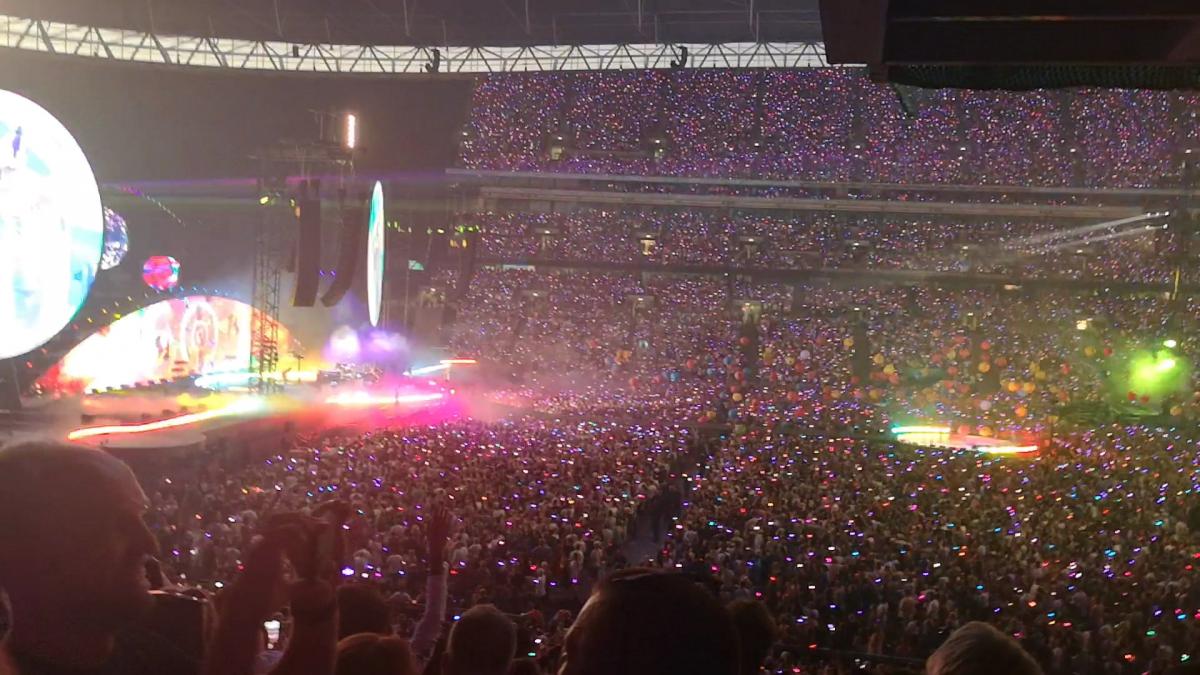 Coldplay fan and IFoA Sustainability Board member Rosalind Rossouw explores how the band is showing what’s possible if we all act together on climate change.
Coldplay fan and IFoA Sustainability Board member Rosalind Rossouw explores how the band is showing what’s possible if we all act together on climate change.
Coldplay’s Music of the Spheres world tour made its way to Wembley in August. With the entire tour aiming to operate as close to net zero as possible, there is a lot we can learn from the precedent the band has set.
The group entered the arena with an enormous welcome from the crowd. As lead singer Chris Martin raised his hands to greet each section of the stadium – like Novak Djokovic celebrating a win – the audience’s 100% compostable LED wristbands lit up.
When you visit Coldplay’s Music of the Spheres webpage, you are met with two words: inclusivity and sustainability.
The band have pledged to make the tour “as sustainable and low-carbon as possible, guided by three key principles: Reduce, Reinvent and Restore”.
They are aiming to reduce the tour’s direct emissions by more than 50% compared to their previous tour and are continuously measuring their environmental footprint using recognised standards.
For example, concert attendees are asked in the tour app to enter which mode of transport they used to get to the venue. The app then uses an estimated round-trip distance from your starting point to calculate how many trees will need to be planted to draw down the tour’s carbon impact. The band is doing this in partnership with reforestation non-profit one tree planted. Fans who commit to a low-carbon means of travel are also rewarded with a discount code to use towards the purchase of any merchandise.
The tour avoids the use of fossil fuels and powers the stage production using renewable energy in various forms, including:
My favourite is the kinetic dance floors: the movement from fans dancing their hearts out is converted into energy to power the show.
At Wembley, a sustainability video was played between sets and the audience applauded each initiative. One initiative, which got the loudest applause, will donate 10% of all earnings equally between various environmental and socially conscious projects and charities including ClientEarth and The Ocean Cleanup.
Inclusivity is the second of the band’s wider intentions to make their concerts “accessible to everyone”. At Wembley, the band made every single concertgoer feel part of the experience. Chris Martin asked everyone in the front to turn around and sing the song ‘Yellow’ to those at the back. He asked everyone to raise their hands and send love to someone out in the world. And there was a surprise guest performance on a separate stage at the opposite end of the stadium.
The words ‘everyone is an alien somewhere’ appear consistently on the band’s apparel and on various items of tour merchandise. What will stay with me the most is the voices of thousands of people spontaneously singing the familiar notes of ‘Viva la Vida’, without prompting, in complete harmony.
The band created what I can only describe as one of the most memorable performances in history with their sensational stage presence and infinite energy. They played their greatest hits over the past 20 years, which for many are the soundtrack to significant moments in their lives.
But they have also set a precedent for others – not just bands – to follow. They have left everyone with an impression of an exceptional example of what is possible and achievable if we act together, sustainably and inclusively.
The IFoA is most certainly on a pathway to sustainably, applying a similar ethos to our own larger actuarial events. At the IFoA, we:
We have also chosen venues for in-person actuarial conferences this year on the basis that they either have or are working towards green credentials. And sustainability, diversity, equity and inclusion sessions all form part of the 2022 GIRO and Life Conference programmes.
Rosalind Rossouw is Head of IFRS 17 Business Implications and Capital Management at Sun Life Financial of Canada (UK). She is a member of the IFoA Sustainability Board and the Diversity Action Group, and is Committee Chair of the 2022 Life Conference. She wrote this blog from her own experience and with further information from Coldplay's website and tour webpage.